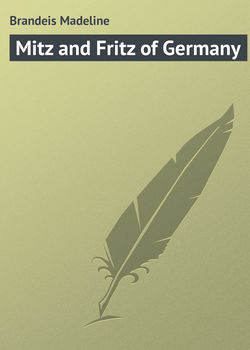Читать книгу Mitz and Fritz of Germany - Brandeis Madeline - Страница 3
CHAPTER III
GOODBYE TO NUREMBERG
ОглавлениеThe day before the toy maker and his family were to start on their journey, Mitz and Fritz went to the market place. They walked through the quaint old streets of Nuremberg where they had lived all their lives. Frank, the dog, followed at their heels.
They stood looking up at an ancient clock on an ancient church. Under the face of the clock sat the figure of Emperor Charles the Fifth.
When the clock struck twelve, a little door at the side opened. A row of toy knights came marching out, followed by seven electors. Each figure bowed stiffly to the Emperor as it sailed past. Then it disappeared into a door at the opposite side of the clock.
Every day this performance took place. Every day Nuremberg children gathered below to watch it. Fritz sighed when it was over.
"That is the last time we shall see it," he said.
"We shall see other things," said Mitzi. "We are going to – to – oh, to every place that we have read about!"
"We shall see the homes of great musicians," said Fritz, whose face was now beaming.
The Germans like to remember their great men. Even the school children are often taken by their teachers on trips to the towns where poets and painters and musicians lived. It is no wonder, then, that Mitz and Fritz were happy and excited about what the next day was to bring.
As they turned to leave the market place, Mitzi suddenly caught sight of some people across the street. They were walking very slowly and gazing about with the air of seeing things for the first time.
"Stay here and hold Frank," said Mitzi to her brother. "I am going over to see those strangers. I am going to ask to guide them through the church."
She crossed the street and approached the people. She felt certain that they must be Americans or English, for she had watched many like them. She decided to show how well she could speak English.
"Gute day," said Mitzi.
"Why, hello, little Gretchen!" said a jolly-looking man.
"I be Mitzi," said the little girl, with a short bow. "I will show you to the church."
The people laughed.
The jolly man said, "You wish to show us to the church? Very well. I think the church will be pleased to see us."
Mitzi took the travelers through the church. She talked a great deal, and sometimes they could not understand what she said. Nevertheless when they came out they gave her some coins. Mitzi put the coins in her pocket and bowed again.
"Danke (dän´kẽ). Danke," she said; which means "Thanks. Thanks."
The man said, "You are a good guide, and the church seemed very glad to meet us."
"Yes, ma'am," said Mitzi.
She was trying to use all the English words she knew. Then she remembered a sentence which an English boy had once taught her. He had been a very naughty boy. He had told her that it was a most polite and respectful thing to say.
So the little German girl lifted her round face to the stranger, smiled sweetly, and said, "You – are – a – silly – goose!"
Mitzi could not understand why there was a roar of laughter from her new friends. She turned and ran across the street to where Fritz and Frank were awaiting her.
"Come. We are going home to lunch now," she said to her brother.
She pulled the coins out of her pocket and showed them to Fritz. Then she pulled something else out of her pocket and began to eat. It was a bit of sausage.
They passed funny houses with pictures painted on them, and old shops full of wonderful toys and ornaments and gingerbread. They passed toy shops and sausage stands. There are a thousand different kinds of sausages in Germany.
Germany is the children's gingerbread country. Think of all the childish delights that have come out of Germany: Christmas trees, cuckoo clocks, Hansel and Gretel, Grimms' Fairy Tales, and the Pied Piper!
And toys! When a toy is marked "made in Germany," we know that it is very fine, because Germany is the toy center of the world.
In Switzerland you would climb the Alps and eat cheese. In Ireland you would kiss the Blarney Stone and eat stew. In Italy you would see the art galleries and eat spaghetti. In China you would visit the Great Wall and eat rice. But in Germany, especially if you are a child, you would go to the toy shops and eat gingerbread.
